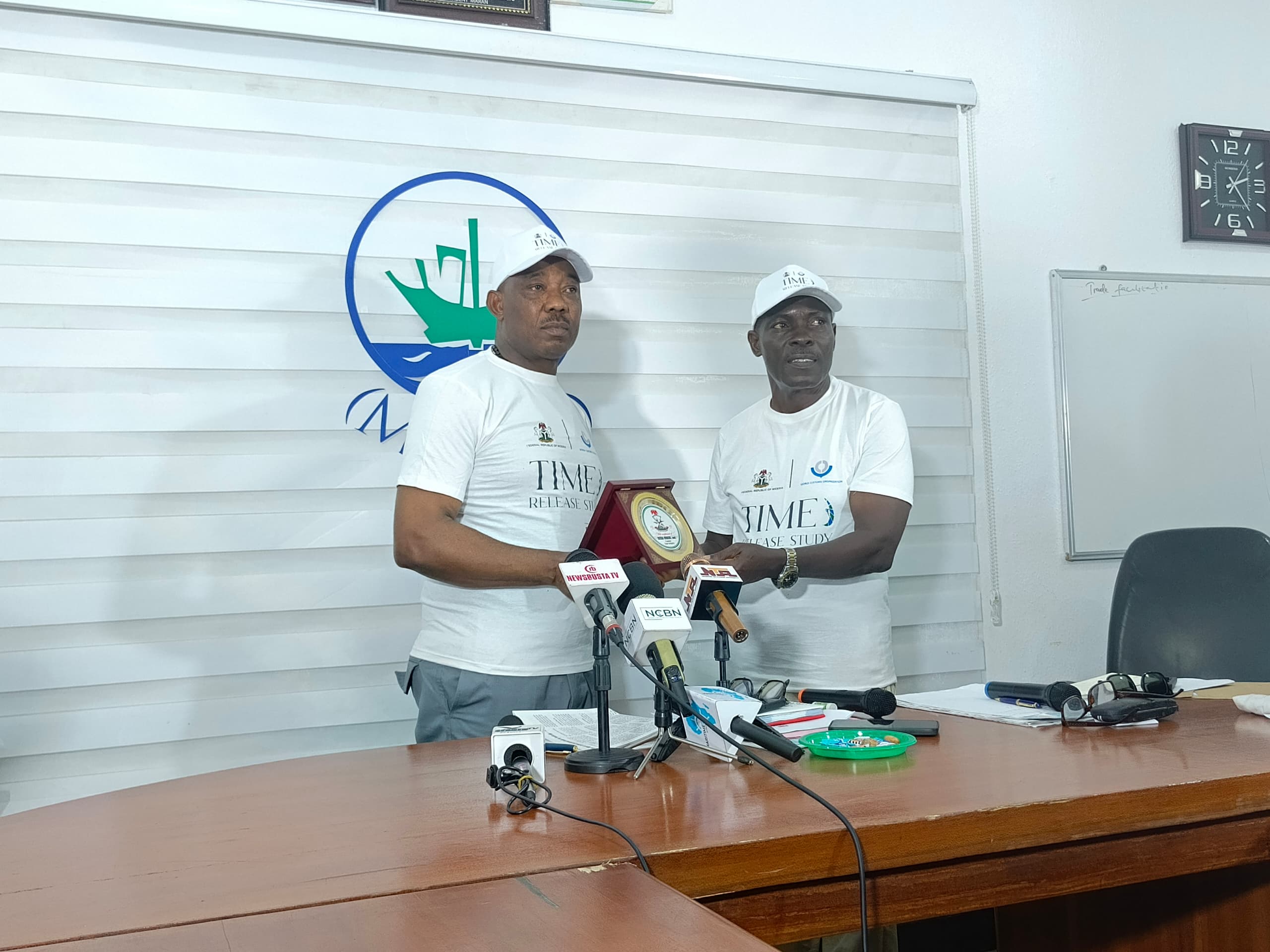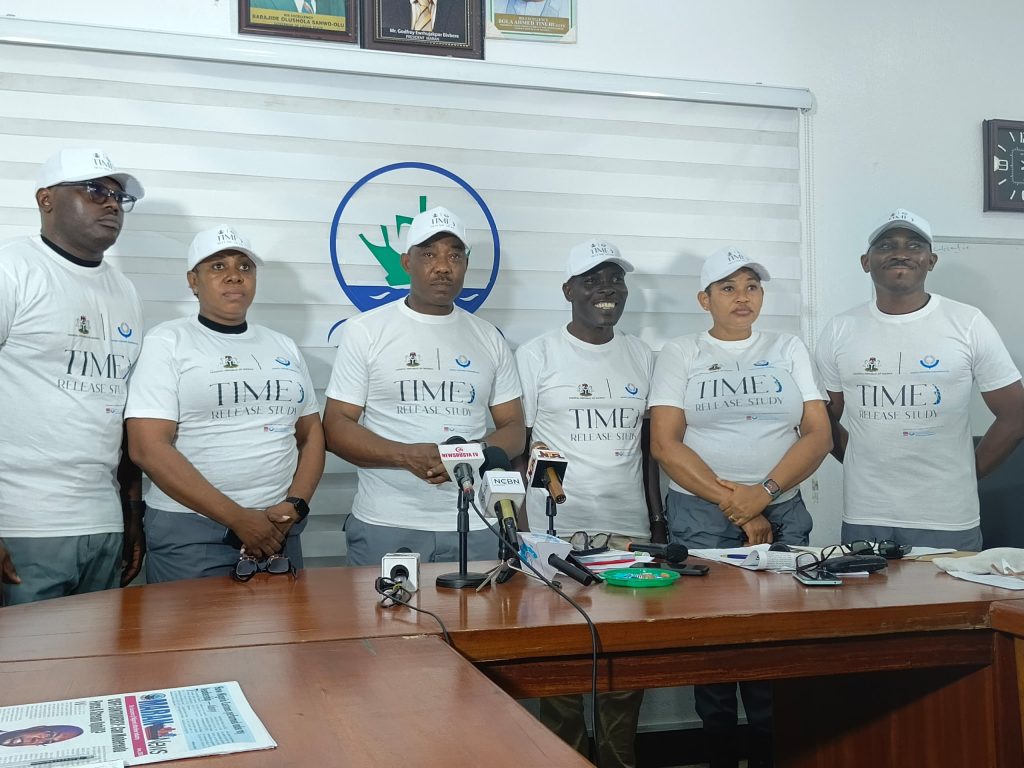Customs Report

Cargo ‘Time Release Study’ Ready In September –Nnadi
BY FUNMI ALUKO
Despite several challenges encountered in collating data, the Tincan Island Port cargo Time Release Study (TRS) is almost ready and barring any unforeseen circumstance, will be unveiled to the international trade community in September this year.

3rd from left, Compt. Nnadi, sandwiched by Command PRO, SC Ngozi Okwara tohis right, and MARAN President, Bivbere to his left; and the CAC’s principal admin officers in a group photograpgh after the briefing on TRS in Lagos, recently
This was disclosed by Comptroller Dera Nnadi mni, Area Controller, Nigeria Customs Service, Tincan Island Port while briefing journalists in Lagos Friday.
The World Customs Organisation (WCO) assisted TRS was launched in Tincan Island Port (TICP) in February 2024 to determine the length of time it takes to clear a cargo at the port.
While speaking to journalists on the activities of his command for the half year 2024 at the Maritime Reporters Association of Nigeria (MARAN) Secretariat, Nnadi the presiding Customs Area Controller for the TRS pilot scheme, Tin Can Island port explained that although his officers and men encountered a number of challenges during the course of the study, but hinted rather excitedly that the report will be released in September this year.
He said: “We had challenges in carrying out the Time Release Study and the biggest challenge was apathy on the side of port users. The port is a very dynamic environment and people are always ìn hurry to clear their goods. So, it is extremely difficult to have them respond to questionnaires.
“But we had to be very creative to get the responses of the importers. We had to organise meetings both physical and on Zoom in other to get the importers and clearing agents involvement in the study.
“We were given a target of 600 respondents but we had to increase the number to 1,000 because Nigeria is a big country. We needed to ensure that we are able to cover an extensive sample large enough to fairly represent the population of the international trade community in Nigeria.”
Nnadi explained further that Tin Can Port was chosen for the TRS pilot scheme because of the port’s apparent notoriety for delay in cargo release, he however noted that there has been a significant improvement after the clearing of the port access roads and reactivation of night operation at the Tincan Port.

The Tin Can Port Customs boss said all agencies in the port and captains of industry who make up the country’s National Trade Facilitation Committee are involved in the TRS, which outcome he said is expected to show the way to timely release of goods from the port, which situation is expected to improve cargo turnaround time significantly.
The highpoint of the briefing on the TRS was when the customs controller appointed MARAN President and Public Relations Officer, respectively, Godfrey Bivbere and Sandra Chukeuyenre, TRS Ambassadors; on behalf of the association.
Understanding Time Release Study
The WCO Time Release Study is a strategic and internationally recognized tool to measure the actual time required for the release and/or clearance of goods, from the time of arrival until the physical release of cargo, with a view to finding bottlenecks in the trade flow process and taking necessary measures to improve the effectiveness and efficiency of border procedures.
The updated version of the WCO TRS Guide, known as the “Guide to Measure the Time required for the Release of Goods (Version 3)” incorporates a number of key features/elements. It brings forward new dynamics and opportunities for Customs Administrations to work in a collaborative manner with other relevant government agencies and trade stakeholders in the arena of performance measurement.
The WCO TRS is specifically referenced in Article 7.6 of the WTO Trade Facilitation Agreement (TFA) as a tool for Members to measure and publish the average release time of goods. The TRS is being increasingly used by Members with respect to strategic planning and the proper sequencing of TFA measures in accordance with their National Committees on Trade Facilitation (NCTF).
Earlier Efforts Instituting TRS
This is not the first time a TRS was being launched at Nigerian trade borders. In 2010, the Nigeria Customs Service underwent an extensive TRS facilitated by the USAID MARKETS Project, concentrating on the Apapa Port and Seme Border.
The Comptroller General of Customs Bashir Adewale Adeniyi had said that approximately 20 overreaching recommendations emerged, encompassing initiatives such as establishing an Authorized Economic Operator (AEO) program, introducing a single window system, procuring extra cargo handling equipment, and undertaking infrastructure repairs at the ports, among others.
Adeniyi further explained that a second endeavor was made in 2018, albeit unsuccessful, primarily due to inadequate collaboration among the pertinent agencies involved.
While launching the current TRS at Tincan Port in February, the Customs CG said: “Today’s exercise builds on the lessons learned from both the 2010 and 2018 attempts. We have made significant progress since then, including the implementation of paperless clearance and advancements in our AEO programmes.
“Provisions under the new Customs Act now speak to the imposition of penalties to deter non-compliance. Today, we are joining other Customs Administrations in the world that have embraced the tools developed by the World Customs Organisation (WCO) to promote the growth of international trade.































